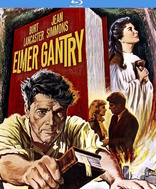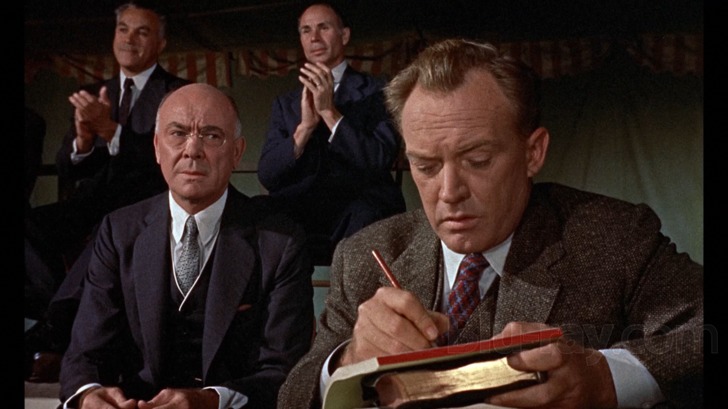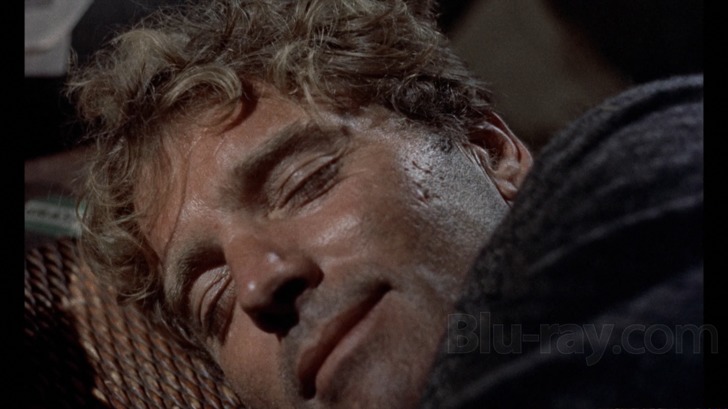Elmer Gantry Blu-ray Movie
HomeElmer Gantry Blu-ray Movie 
Kino Lorber | 1960 | 147 min | Rated PG | Sep 23, 2014
Movie rating
7.6 | / 10 |
Blu-ray rating
| Users | 0.0 | |
| Reviewer | 4.0 | |
| Overall | 4.0 |
Overview
Elmer Gantry (1960)
Hard-living traveling salesman Elmer Gantry joins with tent-revival evangelist Sister Sharon Falconer to sell their boisterous vision of Christianity to the American people in the 1920s, but Elmer's womanizing past threatens his new career as a preacher.
Starring: Burt Lancaster, Jean Simmons, Arthur Kennedy, Dean Jagger (I), Shirley JonesDirector: Richard Brooks (I)
| Period | Insignificant |
| Drama | Insignificant |
Specifications
Video
Video codec: MPEG-4 AVC
Video resolution: 1080p
Aspect ratio: 1.66:1
Original aspect ratio: 1.66:1
Audio
English: DTS-HD Master Audio 2.0
Subtitles
English
Discs
25GB Blu-ray Disc
Single disc (1 BD)
Playback
Region A (locked)
Review
Rating summary
| Movie | 4.0 | |
| Video | 3.5 | |
| Audio | 3.5 | |
| Extras | 1.0 | |
| Overall | 4.0 |
Elmer Gantry Blu-ray Movie Review
Reviewed by Jeffrey Kauffman October 1, 2014Though she’s remembered today mostly by historians, Aimee Semple McPherson was a cultural phenomenon of almost unimaginable fame and influence for millions of devout believers who found in McPherson a preacher of profound impact and visceral intensity. Long before there was the “tele” part of televangelism, McPherson riveted a nation recovering from the horrors of World War I (and, later, the trauma of the Depression) with her faith healing revival meetings, attracting thousands at a time to what were often carnival like outings involving professions of faith and supposed demonstrations of God’s saving grace in action. Though McPherson hit her stride mostly in the 1920s, she continued to tour and preach throughout the 1930s and 1940s, until she was found dead of a suspected (accidental) overdose of sleeping pills in 1944. McPherson’s bizarrely charismatic personality provided at least some grist for Sinclair Lewis’ mill when he wrote Elmer Gantry in 1927, a satirical look at the “salvation industry” which featured a Semple-esque character named Sister Sharon Falconer, but which in fact focused more on a Falconer acolyte named Elmer Gantry, a fast talking hustler who basically drifts into Falconer’s inner circle and then proceeds to try to take over. It took decades for Lewis’ trenchant observational style to make it to the screen, and even then, Richard Brooks’ 1960 cinematic adaptation of Lewis’ novel jettisoned huge portions of the story, winnowing things down to concentrate on Gantry’s hucksterism, whether or not that proclivity was related to supposedly doing God’s work, or in fact merely the work of Gantry himself. The film took home three Academy Awards that year, including Best Actor for Burt Lancaster, Best Supporting Actress for Shirley Jones (in a role some found shocking for the squeaky clean Rodgers and Hammerstein chanteuse), and Best Adapted Screenplay for Richard Brooks.

Though it may strike some contemporary viewers as hopelessly quaint, Elmer Gantry starts with a text crawl defending its examination of supposedly troublesome “Revivalist” meetings, including a warning not to let “impressionable children” view the film. Three exclamation point filled statements are an indication that the film, while set in the 1920s, is also firmly ensconced in the complacency and conformity of the tail end of the Eisenhower Era. Writer-director Richard Brooks, typically a firebrand who never shied away from controversy, evidently wanted to make sure that Sinclair Lewis’ unsparing exploration of the phenomenon of Revivalism didn’t offend any true believers.
We meet the locquacious Elmer Gantry (Burt Lancaster) in a bar on Christmas Eve, where he’s regaling some of his traveling salesmen buddies with slightly dirty jokes. When a Salvation Army type woman comes through looking for donations, no one in the bar offers up any moolah, at which point Gantry springs into action and reveals both a knowledge of scripture as well as a gift for florid oratory that identifies him immediately as someone who would have been right at home at a pulpit. Brooks doesn’t dwell on Gantry’s backstory, and instead simply dives right in, offering a detailed look at Gantry’s expository finesse as a “given”, without need of much explanation or added information.
Gantry hops a freight but is attacked by other hobos, at which point he jumps off the train (shoeless), making his way to an African American service where he befriends the pastor, gets some new shoes, and ultimately learns about a visiting Revivalist named Sister Sharon Falconer (Jean Simmons). Gantry attends one of the good Sister’s meetings and is bowled over by her saintly demeanor, wry sense of humor and attractive mien. He manages to wheedle his way into the Sister’s good graces courtesy of the Sister’s song leader, Sister Rachel (Patti Page of “How Much is that Doggie in the Window?”, “Tennessee Waltz” and “Hush, Hush, Sweet Charlotte” fame). Falconer’s manager Bill Morgan (Dean Jagger) is initially unsure of Gantry, but soon realizes that Gantry’s gift of gab can play into the overall parade of the revival tent shows, increasing the “take” from the offering plate.
Meanwhile, Gantry makes an unlikely friend, if not an outright ally, in journalist Jim Lefferts (Arthur Kennedy, warming up for the similar role he would soon play in Lawrence of Arabia.) Lefferts serves as the “objective” perspective on events, vacillating between a jaundiced view of the supposed faith healing going on and a grudging appreciation for the way Gantry and Falconer tag team the audience of devout believers, extracting not just professions of faith but lots of cold, hard cash.
Romance seems to be sparking between Gantry and Falconer, despite their obvious differences and Sharon’s equally obvious lack of experience in the sex department. Things take a somewhat surprising turn, however, when one of Gantry’s former conquests, a minister’s daughter named Lulu Baines (Shirley Jones), enters the picture. Lulu has become a so-called “fallen woman,” albeit one who, to twist a phrase from contemporary parlance, has fallen but doesn’t especially want to get up. Lulu still obviously carries a torch for Gantry while at the same time resenting him both for how he changed her life as well as the success he’s unexpectedly experiencing.
Lulu’s scheming provides much of the drama for the second half of the film, as she ultimately attempts to get Gantry into a compromising position which will reveal to the world what a heel he really is. When Lulu does manage to get incriminating evidence against Gantry, Sharon is forced to confront the reality behind Gantry’s forceful facade, and a showdown of sorts between the women ensues. The film perhaps cartwheels too quickly through a number of quick conflicts and resolutions at this point, depicting both Gantry’s penance (such as it is) as well as what might be termed a hint of saving grace, courtesy of Lulu’s change of heart.
Brooks opts for a hyperbolic climax which sees Gantry returning to Sharon’s fold (and/or tent) to hopefully patch things up and make a new start. An unlikely fire instead results in tragedy, with Brooks opting for a probably too on the nose portrayal, with red tints and angry flames, as if to suggest Elmer has entered the Gates of Hell for all of his duplicity and machinating. But it’s already been made clear that Gantry is a survivor, come (figurative or literal) hell or high water, and Elmer Gantry suggests that the larger than life character may have matured but still has his eyes set on gullible believers and any spare change they may have lying around.
Elmer Gantry Blu-ray Movie, Video Quality 

Elmer Gantry is presented on Blu-ray courtesy of Kino Lorber Studio Classics with an AVC encoded 1080p transfer in 1.66:1. While this release sports a bit more vivid color than some other recent Studio Classics outings, it still evidences slight but noticeable fade. That said, things are nicely saturated and despite some fluctuations in color space throughout this presentation, overall things look relatively accurate given a few limitations. Flesh tones can be both ruddy brown or pale at times, but other colors come through consistently, including greens and purples. The grain field here is fairly heavy at times but natural looking and untouched by any digital intrusion. Things are relatively soft looking throughout this presentation, including even midrange shots where detail is decent but not completely impressive. Close-ups fare better, with generally above average detail (see screenshot 5). Contrast is consistent. The film has a number of opticals, and those exhibit even more softness, grain and dirt, as should be expected. Age related damage is also at expected levels, with minor blemishes including minus density on display (see Simmons' cheek in screenshot 2). Brooks, who married Simmons shortly after this film's release in 1960, favors gauzy soft focus for his star, and some of Simmons' close-ups are on the hazy side as a result.
Elmer Gantry Blu-ray Movie, Audio Quality 

Elmer Gantry features a lossless DTS-HD Master Audio 2.0 mono mix. There are some really grating speed fluctuations that afflict the opening credits sequence's theme by Andre Previn, but after that anomaly, things settle down and the rest of the soundtrack has no overt distractions. Dialogue comes through just fine, and Previn's Oscar nominated score (including several songs) sounds fine.
Elmer Gantry Blu-ray Movie, Special Features and Extras 

- Shirley Jones Interview (1080p; 12:17). Jones, still looking lovely and youthful, offers up some fun reminiscences about the film and role that won her an Oscar, including the fact that Richard Brooks wanted Piper Laurie for the part.
- Trailer (1080p; 3:18)
Elmer Gantry Blu-ray Movie, Overall Score and Recommendation 

Lancaster simply inhabits the role of Elmer Gantry in this film, helping to make some of Brooks' shorthand with regard to Sinclair Lewis' original novel a bit more palatable. While Simmons seems to be riffing on her similarly naive but well intentioned goody two-shoes role from Guys and Dolls, Shirley Jones is revelatory cast completely against type as a scheming prostitute. Brooks keeps things moving along with a lot of energy, so that the film's lengthy running time never seems like a chore. There are some relatively minor issues affecting video and audio here, but generally speaking technical merits are very strong, and Elmer Gantry comes Highly recommended.
Similar titles
Similar titles you might also like

Nightmare Alley
1947

Flamingo Road
Warner Archive Collection
1949

The Great Waldo Pepper
1975

Ruthless
1948

The Strange Love of Martha Ivers
4K Restoration
1946

The Bad and the Beautiful
Warner Archive Collection
1952

Hard Eight
Sydney
1996

Scarface
1932

All the King's Men
Limited Edition to 3000 - SOLD OUT
1949

The Revolt of Mamie Stover
Limited Edition to 3000
1956

Anna Lucasta
1958

Advise & Consent
1962

Rain
90th Anniversary
1932

Home from the Hill
1960

Sweet Bird of Youth
Warner Archive Collection
1962

Ace in the Hole
1951

Pittsburgh
1942

The Great McGinty
1940

The Pawnbroker
1964

Lenny
Limited Edition to 3000 - SOLD OUT
1974